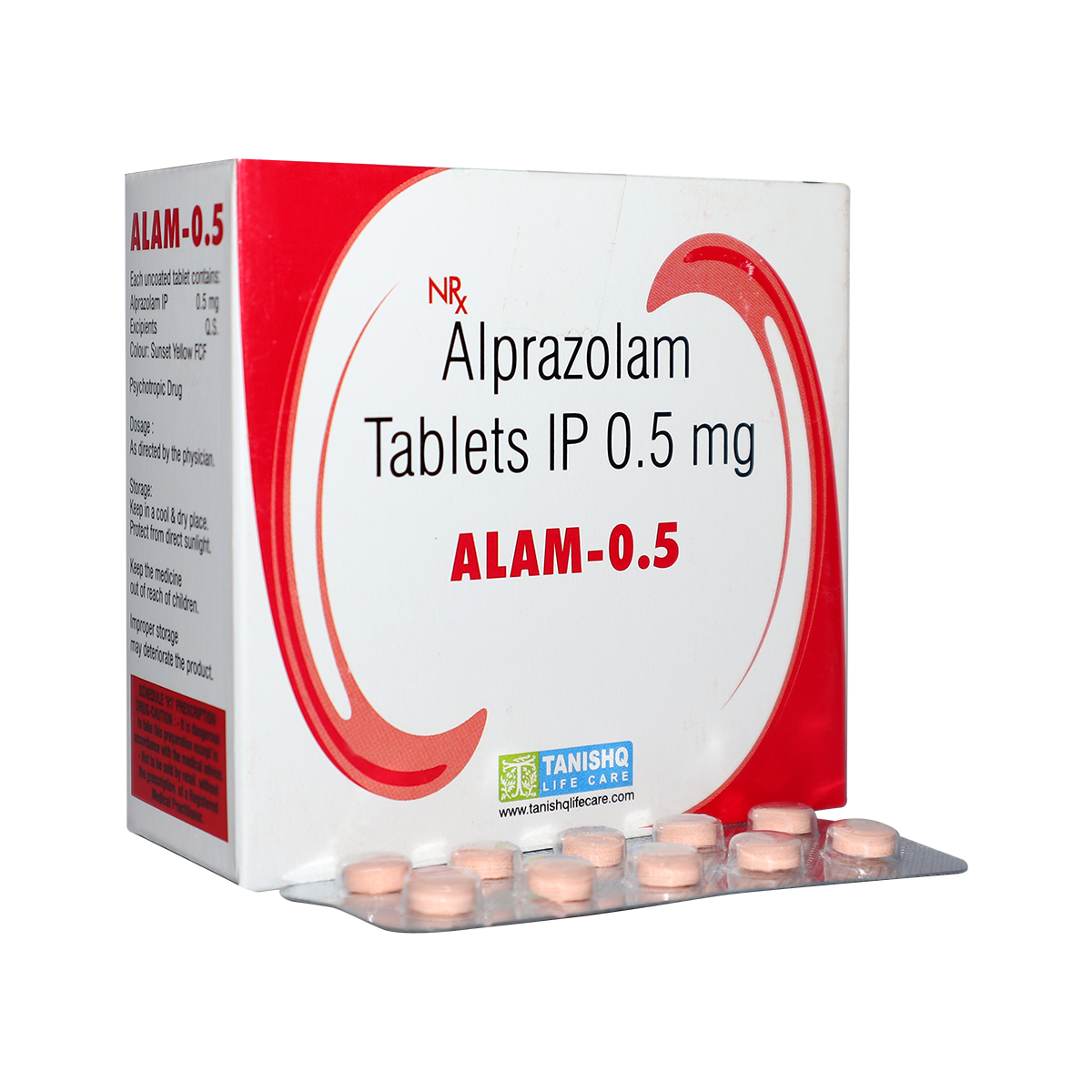
Alprazolam 0.5mg Tablet
Alprazolam is a benzodiazepine commonly prescribed for the management of anxiety disorders, panic disorder, and occasionally for short-term relief of insomnia. It acts as a central nervous system (CNS) depressant, working by enhancing the effects of the neurotransmitter GABA, which helps to reduce brain activity, producing calming and sedative effects.
- Recommended Usage
Indications
- Generalized Anxiety Disorder (GAD): Treatment of excessive and uncontrollable worry.
- Panic Disorder: Relief from recurrent, unexpected panic attacks, with or without agoraphobia.
- Short-term management of anxiety-related conditions (e.g., stress-related anxiety or insomnia).
- Off-label use: Sometimes used for conditions like muscle relaxation, sedation, or pre-anesthetic use in certain clinical settings.
Dosage and Administration
Starting Dose: Typically, 0.25 mg to 0.5 mg taken two to three times daily, depending on the severity of the symptoms.
Titration: The dose may be gradually increased in 0.25 mg to 0.5 mg increments at intervals of 3-4 days, based on clinical response and tolerability.
Maintenance Dose: Usual therapeutic range is between 1 mg to 4 mg per day, divided into two or three doses.
Maximum Dose: The maximum recommended dose is 4 mg/day, though doses above 2 mg/day are typically used for panic disorders.
Elderly or Debilitated Patients: Start with lower doses (e.g., 0.25 mg twice daily) and adjust carefully to minimize the risk of sedation, dizziness, or falls.
Renal/Liver Impairment: Lower doses may be needed in individuals with liver or kidney dysfunction.
Precautions
Tolerance and Dependence: Chronic use of alprazolam can lead to tolerance, where higher doses are needed to achieve the same effect. Physical dependence may also develop, leading to withdrawal symptoms if the drug is abruptly stopped. Dependence risk increases with prolonged use.
o Withdrawal Symptoms: These can include anxiety, irritability, tremors, sweating, and in severe cases, seizures.
o Gradual Tapering: It's important to gradually reduce the dose under a healthcare provider’s guidance if discontinuing alprazolam to avoid withdrawal effects.
CNS Depression: Alprazolam can cause sedation, drowsiness, and impair mental and motor function. Caution is advised when performing activities requiring mental alertness, such as driving or operating machinery.
Elderly Patients: They are more sensitive to benzodiazepines and may experience increased sedation, confusion, dizziness, and impaired coordination. Start with lower doses and increase carefully.
Alcohol and Other CNS Depressants: Use of alprazolam with alcohol or other sedating drugs (e.g., opioids, barbiturates, other benzodiazepines) can cause severe sedation, respiratory depression, coma, and potentially fatal outcomes.
Liver and Kidney Impairment: Alprazolam is metabolized by the liver, and its clearance may be reduced in patients with liver or kidney dysfunction. Lower doses may be required.
Pregnancy: Alprazolam is classified as Category D during pregnancy (evidence of fetal risk), and its use is typically avoided, especially in the first trimester. If prescribed during pregnancy, the potential benefits and risks must be carefully weighed.
Breastfeeding: Alprazolam passes into breast milk, and its use during breastfeeding is generally avoided, as it may sedate the infant.
Product Category
- Anti Infective
- Injectables
- Pre Filled Syringe
- Immunosuppressants
- Anti Ulcerant/ppis
- Joint Care
- Enzymes
- Heamatinic Agents
- Antioxidant Multivitamins
- Laxatives
- Anti Alergic
- Corticosteroids & Combinations
- Anti Fungal
- Medicated Soaps
- Emollients and Moisturisers
- Face Care
- Puva & Sun Protectors
- Hair Care
- Anti Acne Preparation
- Analgesics Antipyretics & Anti Inflammatory
- Anti Spasmodic & Anti Emetic
- Expectorants Antitussives & Mucolytics
- Antidiarrheals
- Cardiac Drugs
- Antipsychotics
- Anti Epileptics
- Migraine
- Anti Dyspetic
